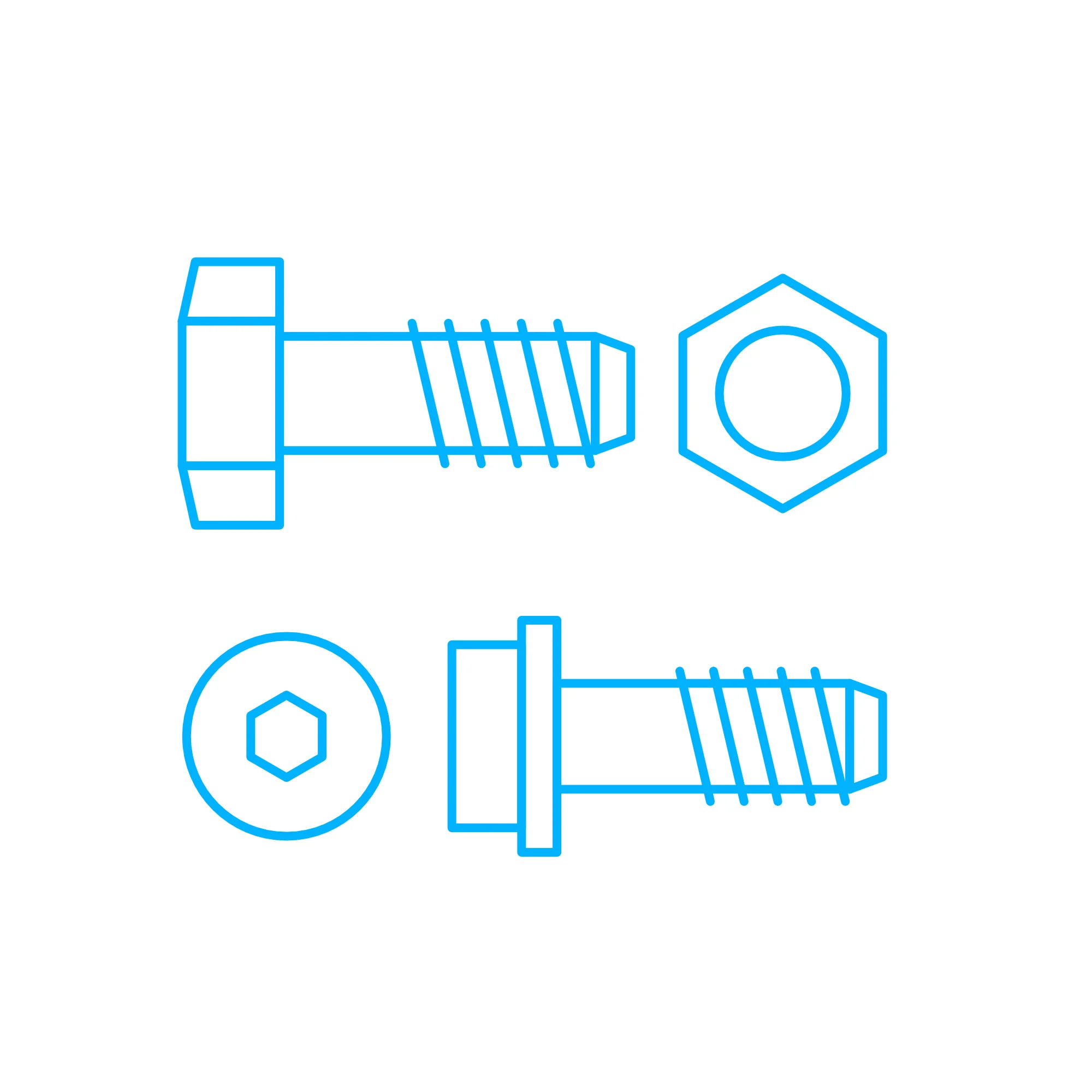TORX SCREW Screws for Marine, Diesel, and Gas Engines
Screws are precision fastening components that create durable, vibration-resistant joints throughout an engine. From cylinder heads and cam covers to fuel systems and turbocharger housings, correctly specified screws hold structural and functional parts together under fluctuating loads, high temperatures, and corrosive environments. Within this category, the TORX SCREW is widely used because its hexalobular drive provides superior torque transfer and low cam-out, enabling consistent assembly quality in marine engine rooms, power plants, and industrial diesel engine applications. Selecting the right screw type, material grade, and coating is critical to maintain sealing integrity, mechanical alignment, and service life.
In engine maintenance and overhaul, screws are not generic consumables. They are engineered elements with defined mechanical classes (e.g., 8.8, 10.9, 12.9), thread forms, head geometries, and surface treatments. When paired with correct tools and tightening procedures, they deliver the clamp load that keeps components seated, prevents leakage, and preserves clearances essential to performance and safety.
Technical Function of Screws and the Role of the TORX SCREW in Marine and Diesel Engines
The core function of a screw in an engine is to generate and maintain clamp load. During tightening, torque is converted into axial tension in the shank; that preload compresses the joint members and resists external forces such as pressure pulsations, thermal expansion, and vibration. The TORX SCREW enhances this process by maximizing tool engagement. Its hexalobular recess distributes contact stress over a larger area than slotted or Phillips drives, minimizing cam-out and head damage. In practice, this allows repeatable torque application, better torque-to-tension correlation, and fewer assembly defects on marine engine skids and diesel engine modules.
Material and coating choices are equally important. High-strength alloy steel screws (e.g., property class 10.9/12.9) are common in structural and high-load joints, while stainless or coated steels resist corrosion in salt-laden marine atmospheres. Heat-resistant alloys are preferred near exhaust manifolds and turbochargers. Precision threads—often per ISO metric standards—reduce friction variability, and paired with lubricants or specified dry coatings, they stabilize the K-factor that underpins torque settings. In fuel systems and covers, thread sealants and washers complement the screw’s mechanical function to ensure leak-tight joints. Using the correct TORX SCREW OEM parts simplifies controlled tightening with power tools, speeding assembly while protecting the drive recess and tools.
Key characteristics and advantages of Screws in engines
· High clamp-load capability for dynamic, high-vibration environments.
· Hexalobular drive on a TORX SCREW minimizes cam-out and head wear.
· Consistent torque-to-tension behavior with proper lubrication or coating.
· Material classes up to 12.9 for demanding structural joints.
· Corrosion- and heat-resistant options for marine engine and exhaust areas.
· Precise threads for sealing reliability and alignment.
· Compatible with controlled tightening methods and preload verification.
· Supports fast, damage-free assembly and service.
Why Screws Are Critical for Engine Reliability and Service Life
Reliable joints protect the entire engine system. Insufficient preload or degraded screws can trigger leaks at covers and manifolds, misalignment of rotating assemblies, turbocharger flange distortion, or even fatigue cracking in housings. In marine engine contexts, corrosion can attack unprotected screws, reducing cross-section and clamp force; in diesel engine generator sets, thermal cycles can relax poorly specified joints, causing vibration-induced loosening. The downstream effects include oil or coolant loss, exhaust leaks that elevate backpressure, sensor faults from grounding issues, and unplanned downtime—often far costlier than the screw itself.
Common issues when screws are not in proper condition
Loosening from inadequate preload, thread galling on stainless combinations without lubrication, hydrogen embrittlement from incompatible coatings on high-strength screws, and wear or rounding of drive recesses are typical risks. Each of these reduces serviceability and can compromise safety. Periodic inspections should check torque retention, corrosion state, head condition, and any signs of fretting at the joint interface.
Advantages of OEM Spare Parts Suitable for Screws
Choosing OEM spare parts suitable for screws ensures consistent mechanical properties, geometry, and coatings that match the original joint design intent. Tight tolerances on head height, recess geometry, thread pitch, and concentricity lead to predictable torque-tension behavior. Verified heat treatment and metallurgical quality deliver the fatigue strength needed for long service intervals. Coating compatibility prevents galvanic issues on aluminum or coated steel housings and provides stable friction coefficients for repeatable tightening. For purchasers and shipowners, this translates to higher uptime, fewer reworks, and controlled lifecycle costs.
In practical terms, OEM spare parts suitable for the TORX SCREW provide reliable tool fit, reduced assembly scrap, and consistent performance across batches. Traceable production and adherence to standards such as ISO 10664 (hexalobular internal driving feature) and ISO 898-1 (mechanical properties of fasteners) underpin process control. For diesel and gas engines, this consistency protects performance, reliability, budget, and service life.
MOPA — Your Partner for OEM Parts Screws and TORX SCREW
MOPA is an experienced, reliable partner for OEM spare parts in the category of screws, including every critical TORX SCREW used in diesel and gas engines. We focus on speed, quality, and security in the trade of OEM parts, helping technical teams source the exact specification—material grade, coating, and drive type—needed for safe, efficient overhauls. Our team supports cross-referencing by part number, documentation requirements, and logistics to minimize downtime for fleets and power plants. Whether you maintain a marine engine or an industrial genset, MOPA streamlines procurement with precise fit and on-time delivery.
Conclusion
Screws are foundational to engine integrity, and the TORX SCREW is the preferred choice where controlled torque, fast assembly, and high clamp loads are essential. Using OEM spare parts suitable for screws safeguards performance, reliability, and service life while protecting budgets through reduced rework and downtime.

